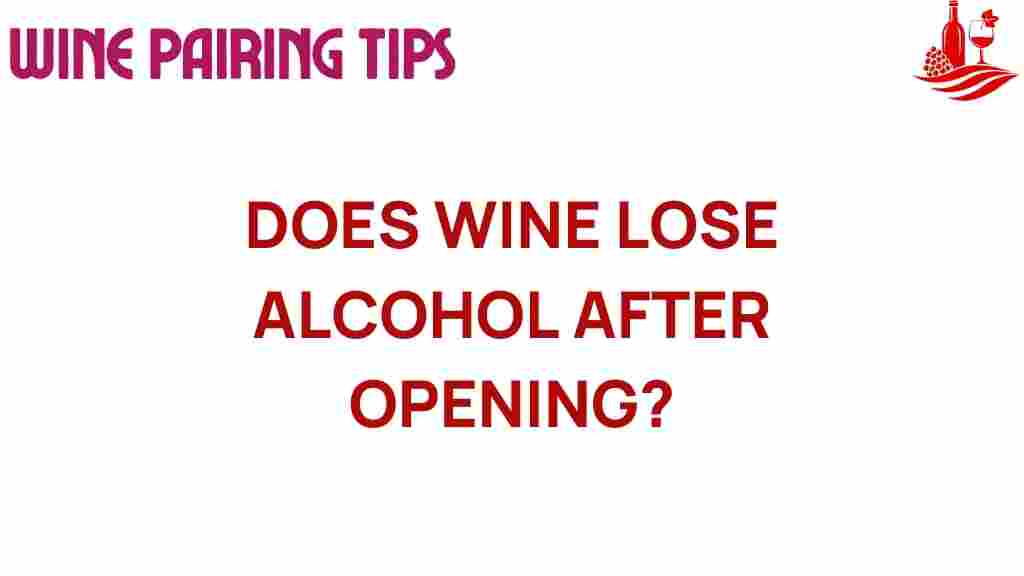Does Wine Lose Alcohol After Opening? Understanding Wine Alcohol Content
When you pour yourself a glass of wine, the last thing on your mind might be whether its alcohol content will change after you’ve opened the bottle. As wine enthusiasts, we often wonder about the nuances of wine preservation, oxidation, and how these factors affect our beloved beverage’s flavors. In this article, we will explore the science behind wine alcohol content, the effects of oxidation, and how proper wine storage can extend the open wine shelf life without compromising its quality.
The Basics of Wine Alcohol Content
Before diving into the details of how wine loses its alcohol after opening, it’s essential to understand what wine alcohol content actually refers to. Wine alcohol content is generally measured as a percentage of alcohol by volume (ABV). Most wines range from 8% to 15% ABV, with variations depending on the type of grape and the winemaking process.
Alcohol in wine is created during fermentation when yeast converts sugars into alcohol and carbon dioxide. This process results in a delicate balance between the wine’s flavors, aromas, and alcohol levels. However, once the bottle is opened, this balance can be affected by several factors.
What Happens to Open Wine? Oxidation Explained
Oxidation occurs when wine is exposed to oxygen, a process that can significantly alter its flavor and aroma. When you open a bottle of wine, you’re introducing oxygen into the mix, which initiates a series of chemical reactions. While some oxidation can enhance a wine’s flavors, excessive exposure can lead to spoilage.
Here’s how oxidation affects wine after opening:
- Flavor Changes: The wine may develop more complex flavors initially, but over time, it can turn flat or even unpleasant.
- Aroma Alteration: Aromas can become muted or unpleasant as the wine interacts with oxygen.
- Color Shift: Red wines may fade, and whites may darken due to oxidation.
Wine Preservation Techniques
To maintain the quality of your wine after opening, it’s essential to understand effective wine preservation techniques. Here are several methods to keep your wine fresh for as long as possible:
- Re-corking: Always re-cork the bottle as tightly as possible to minimize oxygen exposure.
- Wine Pump: Use a vacuum pump to remove air from the bottle before sealing it again. This can help slow down oxidation.
- Wine Preserver Gas: Consider using inert gas wine preservers that displace oxygen in the bottle.
- Refrigeration: Store opened wine in the refrigerator to slow down the oxidation process, even for red wines.
Understanding Open Wine Shelf Life
The open wine shelf life varies depending on the type of wine and how well it is preserved. Here’s a general guideline:
- White Wine: 3 to 5 days if stored properly.
- Red Wine: 3 to 7 days with good preservation techniques.
- Sparkling Wine: 1 to 3 days, as carbonation diminishes quickly.
These timeframes can vary based on the wine’s characteristics and the preservation methods used.
Does Wine Lose Alcohol After Opening? The Science Behind It
Now, let’s address the central question: does wine lose alcohol after opening? The short answer is no, wine does not significantly lose its alcohol content simply by being opened. However, there are some nuances to consider:
- Evaporation: While alcohol can evaporate, it happens at a very slow rate. If a bottle of wine is left open for an extended period, it may lose some alcohol, but significant loss is unlikely over a few days.
- Oxidation Impact: While oxidation primarily affects flavor and aroma, it does not directly reduce alcohol levels. However, you may perceive the wine’s strength differently due to changes in taste.
Thus, while wine alcohol content remains relatively stable after opening, the overall experience of drinking the wine can be altered due to oxidation and other factors.
Troubleshooting Tips for Preserving Wine
If you find your open wine isn’t tasting as fresh as it should, here are some troubleshooting tips:
- Check Your Storage: Ensure the bottle is stored upright and away from light and heat sources.
- Assess the Seal: Make sure the cork or cap is tightly sealed to minimize air exposure.
- Use Wine Savers: Invest in wine preservation tools like vacuum pumps or gas preservers to extend shelf life.
Fun Wine Facts You Should Know
As we delve into the world of wine, here are some fun wine facts that might surprise you:
- Red wines generally have a higher alcohol content than white wines due to the fermentation process.
- Some wines, like Port or Sherry, have a higher ABV because they undergo fortification.
- Wine can age for decades, but once opened, it’s best enjoyed within a week for optimal flavor.
For more intriguing wine facts, consider visiting the Wine.com website.
Conclusion: Enjoying Your Wine Responsibly
In conclusion, while wine alcohol content remains stable after opening, the experience of enjoying that wine can change due to oxidation and other factors. By understanding wine preservation techniques and the science behind wine storage, you can ensure that each glass remains as enjoyable as the first.
Whether you’re a casual wine drinker or a connoisseur, appreciating the nuances of wine science will enhance your experience. Remember to store your wine properly and enjoy it fresh for the best flavors. Cheers to your next glass of wine!
This article is in the category Tips and created by Wine Pairing Tips Team
